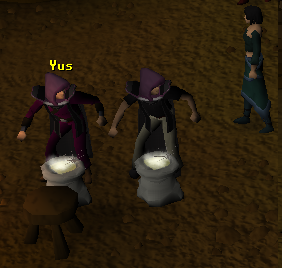 Nobody should ever get away with holding a knife to a 13 year old boy and demanding things from his Runescape bank. That is assault and intimidation, as well as morally repulsive. Convicting his attackers will probably be applauded throughout Gielinor.
Nobody should ever get away with holding a knife to a 13 year old boy and demanding things from his Runescape bank. That is assault and intimidation, as well as morally repulsive. Convicting his attackers will probably be applauded throughout Gielinor.
But there will be more unease about the second aspect of the charges. Does anyone really want real world value conferred upon in-game items?
There have been sporadic court-cases concerning virtual theft, but the whole issue remains entrenched in a legislative no man's land. Game developers would rather that it stayed there, as conveying real world value on pixel wealth could pave the way for further legal battles.
In this most recent case, the Dutch Advocate General had advised, "Virtual objects can represent an economic value both inside and outside the game. They are also individually distinguishable and transferable".
While great for the victim of the theft, this could spell bad news for Runescape's creators Jagex. They cannot be held accountable for the potential loss of pixel possessions, as long as worth is confined to in-game activities.
Say, for example, my Runescape character was to die while fighting a dragon. Amongst my losses was a shield, which I had spent many hours working towards owning. At the moment, Jagex could simply answer that is the nature of the game. You win some, you lose some, and you should have taken an anti-fire potion with you to the dragon.
But if my shield now has real world value, then I could make an argument that I have been emotionally affected by its loss. The statement that this is the 'nature of the game' now becomes an accusation. Jagex created an environment in which I was forced to relinquish my shield. My psychological distress could legally be their fault, though finding a judge to confirm that might be trickier.
Jagex would be more at risk from people suing them after being banned from the game. Now the company will have purposefully, and with intent, separated an individual from a bank full of real world value. They would have nullified perhaps years' worth of time and energy.
The decision of the Hague could well open the gates for a test case of this kind. The judge stated that the amulet and mask had intrinsic value because the victim had invested something. This is a subtle difference to anything that has gone before. It cut Jagex entirely out of the equation and afforded a measure of ownership onto the 13 year old who possessed them inside the game.
If that is confirmed with more legal rulings, then Jagex will have to concede that they do not have any proprietorial claim over items in their own game. At the very least, that will see a boom in real world trading occurring quite openly over on eBay.
In a worse case scenario, it could result in more legal challenges than Jagex or any other gaming company would ever survive.


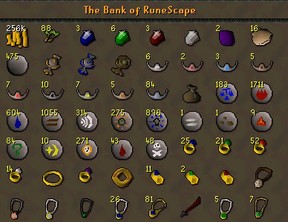 A twenty year old man has been ordered to perform 144 hours of community service for virtual theft.
A twenty year old man has been ordered to perform 144 hours of community service for virtual theft.


 Nobody should ever get away with holding a knife to a 13 year old boy and demanding things from his Runescape bank. That is assault and intimidation, as well as morally repulsive. Convicting his attackers will probably be applauded throughout Gielinor.
Nobody should ever get away with holding a knife to a 13 year old boy and demanding things from his Runescape bank. That is assault and intimidation, as well as morally repulsive. Convicting his attackers will probably be applauded throughout Gielinor.






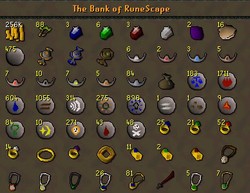

 St Tydecho's Churches in West Waleson 09/03/2014
St Tydecho's Churches in West Waleson 09/03/2014
 Goodies for an Outlander Premiere Partyon 03/06/2015
Goodies for an Outlander Premiere Partyon 03/06/2015
 Holocaust Memorial Day Interview with Rainer Höss, Grandson of Rudolf Architect of Auschwitzon 01/24/2015
Holocaust Memorial Day Interview with Rainer Höss, Grandson of Rudolf Architect of Auschwitzon 01/24/2015
 Romantic Valentine Gifts for an Outlander Fanon 01/16/2015
Romantic Valentine Gifts for an Outlander Fanon 01/16/2015

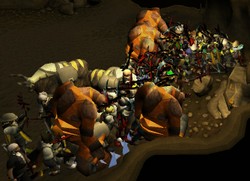
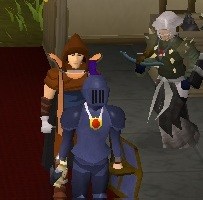

Comments
Oh! I didn't know that nuance of Dutch law. I just assumed that the boy's lawyer had decided to push it into a test case.
This puts a slightly different complexion on it. But only changes it from maverick lawyer making their name to accidentally testing to waters. I should imagine that this will be the first of many more cases like it.
I have the feeling that in ten years time, there is going to be a raft of legislation all over the world regarding virtual goods.
This is a legal case I've been very interested in. Some commenters have been wondering why the court of appeal was so interested in the runescape items. The reason is that in Dutch law, assault carries a lower sentence than assault and robbery. The defendants were appealing to try and get their punishment reduced from the higher 'assault and robbery' tarrif to the lower 'assault' one. Their 3 grounds for appeal were that they hadn't stolen "good(s) belonging wholly or partially to any other person", which is the relevant part of the law. They said that virtual goods are not 'goods', that the vitrual good were 'data' (there already being case law about data ownership) and that because there is a clause in the small print of the game's license that says all in-game items belong to the game's authors, they were not taken from the victim at all, as they were not in his possession, but in the possession of the game's developers the whole time.
Both brilliant choices! I lost whole hours of my life to Mahjong Solitaire last year. Perfect distraction. LOL
I think I'll stick with pacman. Oh. And mahjong solitaire. That's about my speed. LOL.
They can't legally buy and sell their characters on eBay, but it happens anyway. When it does, you can only hope that it's some cash-strapped, disillusioned gamer, because otherwise it really is a criminal gang.
As a Runescape player, I'm besieged daily with phishing attempts through my e-mail. They are written as if they come from Jagex, but they feed into an illegal site. The object is to gain my game account password. If they did that, then you can be sure that my in-game bank would be stripped of goods to be sold on the gaming black market.
The characters themselves are also desirable and if the player hasn't set up any security (recovery questions etc), then that can also be sold on. They are sold to impatient people who can't be bothered to play through the 'noob' levels, in order to get to the exciting things unlocked later on in the game.
In MMORPGs, it's not like ordinary video games, where the main fun is in making that journey for yourself. Instead, you work to get to even better bosses etc at the end, and there's no limit on the fun that you can have there.
I do love your analogy of a car replacing a horse and buggy. Welcome to the dark side of cyberspace!
I really didn't understand that one can buy and sell their characters on eBay. Well, that changes it then entirely. That means that gaming could become a form of self-employment if the gamer builds up characters and then sells them on eBay. I can understand that concept but I really don't understand why anyone would want to buy a game character on eBay.
If this is the wave of the future, then I understand our great grandparents who were horrified when the car replaced the horse and buggy.
2/2
So if a court of law decides that those parallels really do constitute real world wealth, then the implications become immense. Say that I put eight years into building up my game avatar, then the game company locked me out of my account. I could sue the company.
Or a court decides that yes, if the time and effort has been put in, then that avatar and its game bank has to belong to the player. Suddenly you have a real world source of wealth. You can sell that character on eBay.
The dominoes start falling big-time then. Highly desirable characters could fetch a high price (because the buyer doesn't have to put years of work into it). You're getting the gaming equivalent of selling diamonds. People get beaten up or bumped off for less.
Sweat shops have already been established to produce materials and currency in-game, now you're going to have the same for building up characters. That already happens, but underground and on the black market. Those caught are immediately banned. This would allow it to happen wholesale and those purchasing characters would be covered by consumer rights. Watch the sweat shop explosion happen in the next breath.
It's a real minefield, which isn't just about gamers trying to impose confusion onto simple bullying. But it's also looking increasingly like this is where the future is heading.
You are describing the situation as it currently is; and every gaming company in the world is fervently praying that it says that way.
Treat the assault as a separate issue. That is against the law and long should that remain the case. The assailants were prosecuted for it and justice was done. The young boy should never have been threatened with a knife for whatever reason. That behavior is unacceptable.
Now for the thorny issue. Say that you do an hour's work and you earn £10. That £10 goes into your bank. You have the right to spend your £10 on whatever you wish.
In Runescape, much of the wealth comes from working. It might be an hour of clicking a mouse, but us writers earn from an hour of clicking a keyboard and it's only a few inches away.
After that hour, the player has earned 10gp (it would be more, but I'm keeping it simple). It goes into his or her Runescape bank. The player has the right to spend that 10gp on whatever they wish.
The only difference so far is pixels. You could go and buy a loaf of bread to keep yourself alive in real life. The RS player can go and buy a loaf of bread to keep themselves alive in a boss fight.
While no-one is ever going to argue that RS money is more important than real life money, when it comes to human survival, the parallels are there. If someone robbed you of your £10, you would feel understandably upset. You worked for it and you earned it. If someone robbed the player of his/her 10gp, then it's the same emotions, same time-scales involved.
1 of 2 comments (I waffled too much!)
Sorry for being such a dunce, but I don't see the connection with theft here. The only place the "goods" stolen have value is within the computer game. I still don't see any need in this case to go to "virtual theft". The crime was assault in real life.
Now, if someone stole money from a bank account - assaulting someone in London who has a bank account in NYC and forces that person to transfer money "virtually" and therefore "in fact" (because real money has value outside the computer) to their account in Paris, then international laws become complex. Still the assault would be charged in the country in which it happened and the theft - well?
The game issue seems bullying and assault pure and simple. Is that not enough? By adding the "virtual theft", are we not reifying something that is not real and blurring the boundaries between real and not-real for kids who are already confused? What am I missing?
It's only a matter of time before gaming laws become the new legal frontier. There's already a lot of interest and several precedent court cases on the verge of happening.